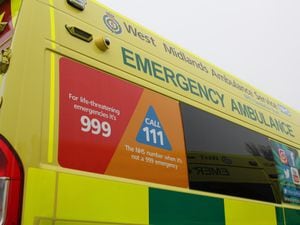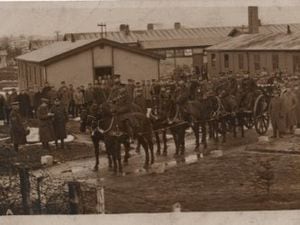Ambulance chiefs told number of calls not behind response time crisis
Ambulance chiefs in the West Midlands have been told that demand is "not the issue" as the service struggles with deteriorating response times.

West Midlands Ambulance Service (WMAS) has seen response times declining since late last year, with the service on track to record its highest ever hospital handover delays this month, with 48,000 lost hours predicted.
The crisis was again discussed at a meeting of the service's trust board on Wednesday, with members told that both handover delays, and 'incident stacking' remain at 'risk rating 25' – the highest possible level of concern.
Handover delays, where ambulances have to wait outside hospitals to hand patients over for treatment, have been the main factor in increasing response times, with crews frequently sitting waiting at hospitals, unable to respond to fresh calls.
The board was told the situation has been driven by capacity at hospitals and in community care, with a lack of social care beds meaning hospitals are often unable to free up space by discharging 'healthy' patients.
Updating members on the performance of the trust, Mark Docherty, director of nursing and clinical commissioning, said: "The only thing I would point to is the continued concern about the impact of handover delays on patients."
The report presented by Mr Docherty said: "As a result of long delays, the number of serious incidents involving serious harm or death is increasing every month."
The board was told that the service has the lowest 'conveyance' rates in the country, but some of the worst handover delays.
It was also updated on an 'Extraordinary Performance Committee', which was set up to examine the situation and look at what could be done to help.
Vikesh Khashu, strategy and engagement director at the trust, told the board that the committee's conclusion was that it could take some actions to alleviate the situation but that none would solve the crisis.
Mr Khashu said one of the fundamental issues was the shortage of staff in emergency units at hospitals.
"The take home message was that in of itself the conclusions are not sufficient to recover the situation and pull us back to where we need to be," he said.
"What is clear is that we have a congested system."
Mr Khashu said that declining response times were not about the number of people calling for ambulances, but hospital and community care capacity to accommodate patients.
He said: "Demand for us is not the issue."
The update from the committee warns that it expects it will take longer than a year for the performance to get back to where it was before the decline started – and says a national or regional plan is needed to address the issue.
It states: "The assessment of the operational directors and universally concurred with by other members of the performance committee was that handover delays had grown exponentially in consecutive months for over a year.
"It would take longer to reverse the current trend and return to pre-pandemic levels (which were also unacceptable, but far better than the current position).
"In essence, this meant immediate solutions were required to reduce harm to patients, but a much more longer-term strategy was required, given the scale of the deterioration, one which was regional/national in scale in reality."
The report adds that the ambulance service alone will not be able to solve the problem, stating: "The committee heard how the scale of the problem of lost hours, far outweighs the ability of WMAS to compensate for this to improve response times to an acceptable level, there are currently days now where we are losing up to 30 per cent of our operational capacity at given points across the region."
It also looked at evidence which said an improvement in response times in May came as hospitals were under less pressure.
The report stated: "The lost hours directly track our response times. We observed a better position in May for lost hours, our response times improved and the numbers of 999 callers asking where is my ambulance (so called duplicate calls reduced), why did May improve? It improved because fewer long length of stay patients were in beds, which enabled emergency departments to see patients more quickly, from improved patient flow."





